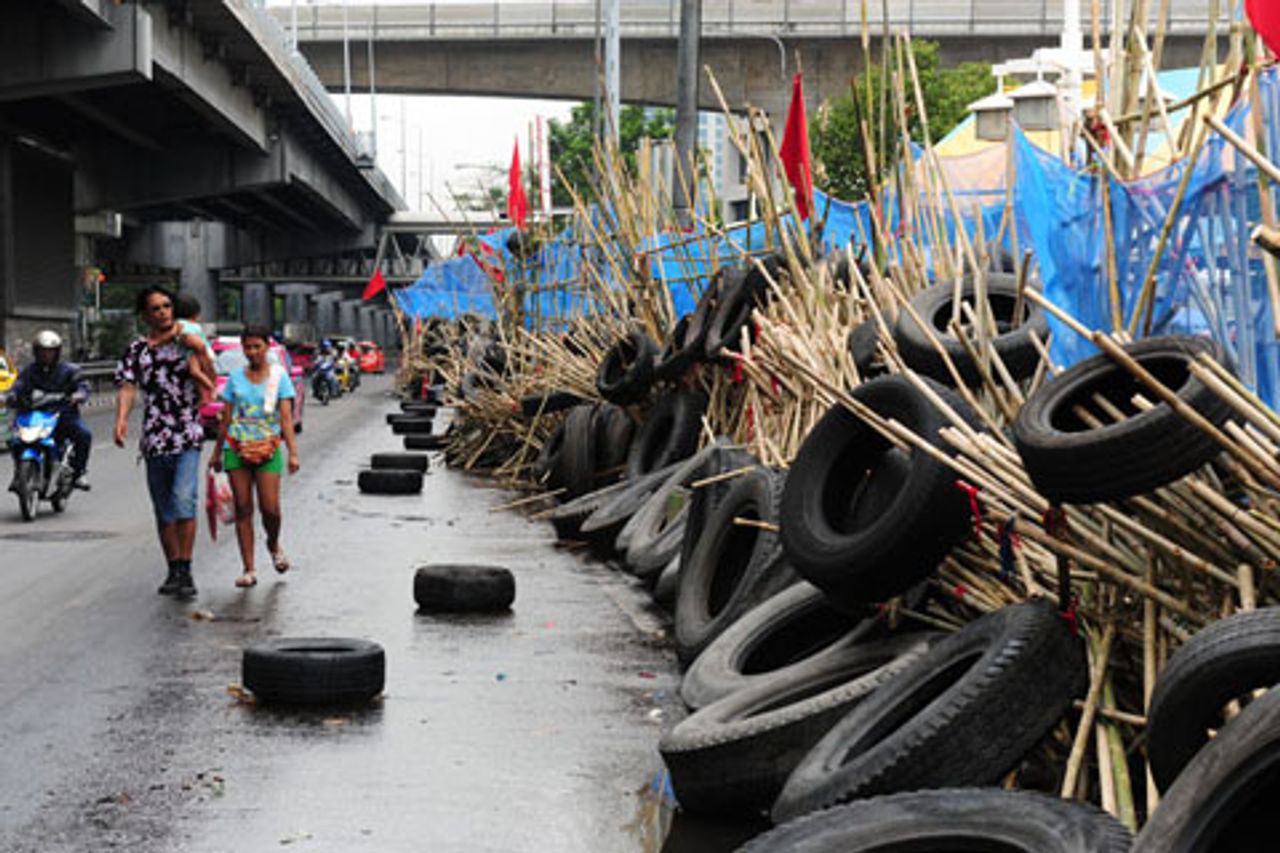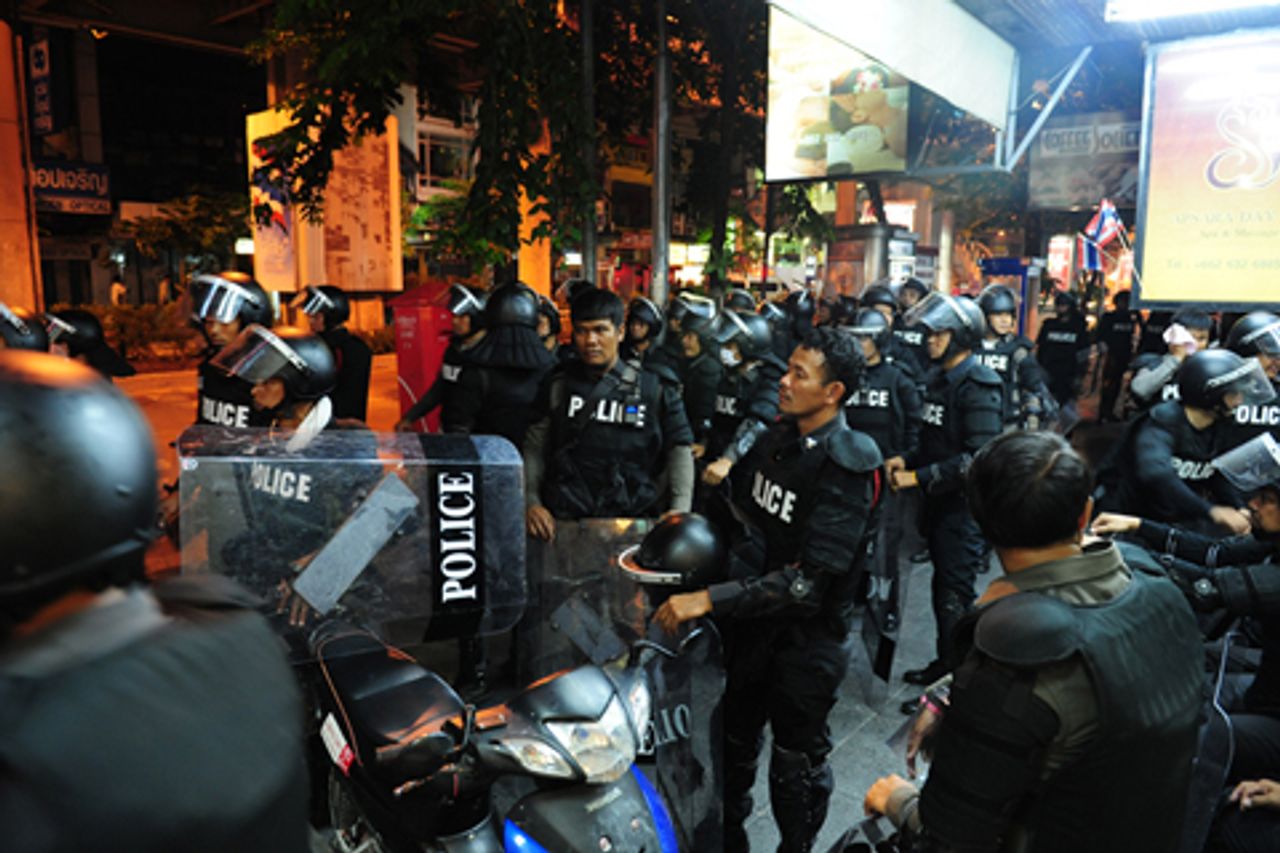In a televised address last night, Thai Prime Minister Abhisit Vejjajiva offered to hold national elections in November as a means of ending the protracted standoff with anti-government protesters camped in Bangkok. At the same time, he insisted that the opposition United Front for Democracy against Dictatorship (UDD) had to accept his plan in full.
The proposal amounted to an ultimatum that came with thinly veiled threats. Abhisit had warned on Sunday: “From now on, what the government will do may risk clashes and losses, but the government knows what it is doing. What needs to be done must be done.”
Last night, the prime minister was speaking after an emergency cabinet meeting, which, according to the Nation newspaper today, “was called to approve the possibility of armed crackdown, which would almost surely be accompanied by terrorism charges against key leaders, who already face lesser charges of violating the state of emergency law”.
Army spokesman Sansern Kaewkamnerd told reporters yesterday that the security forces were preparing to use armoured vehicles to disperse the protesters. UDD demonstrators are entrenched in the up-market Ratchaprasong commercial area of Bangkok and have built barricades from tyres and sharpened stakes. Heavily armed soldiers and police have surrounded the area and established roadblocks to prevent protesters moving to other parts of the city.
 UDD barricades
UDD barricadesThe UDD, which supports former prime minister Thaksin Shinawatra, has sustained its “Red Shirt” protests for two months to demand immediate elections. The army tried to shut down the UDD’s original protest site at the Phan Fah bridge on April 10, provoking street battles that left 25 dead, including four soldiers, and over 850 injured. The attempt failed but the UDD shifted all protesters to the Ratchaprasong area where the stalemate has continued.
In his address last night, Abhisit listed five proposals that had to be accepted by all parties before he would call elections on November 14. These were: respect for the monarchy, reforms to address social injustice, an independent body to monitor media bias, an independent fact-finding committee to investigate recent political violence, including the April 10 clashes, and unspecified constitutional amendments. Abhisit’s vague offer is aimed at reaching a deal with the UDD leaders, but will not resolve the underlying grievances of the protesters.
The UDD draws the bulk of its support from poorer rural areas in the country’s north and northeast. As the protests have continued, elemental class hostility has emerged to the traditional elites, including the monarchy, the military and state bureaucracy, that support Abhisit’s Democrat Party-led government. The military ousted Thaksin in a coup in 2006. Following the 2007 election, court decisions removed two pro-Thaksin governments before Abhisit was finally installed with the backing of the military chiefs.
In recent weeks, the media bias in Thailand has been increasingly blatant. The New York Times reported that state-owned TV channels scroll inflammatory pro-government messages at the bottom of the screen such as: “Sometimes the Thai people have to fight bad Thai people.” Abhisit has claimed that “terrorists” have infiltrated the protests. The government has shut down an opposition television station and blocked at least 420 pro-UDD web sites.
UDD leaders are due to meet today to discuss Abhisit’s plan, but some have already indicated their support. Weng Tojirakarn told the Financial Times: “It is a positive development. I myself am happy with it.” Karkaew Pikulthong’s only objection was the election date, which he said was too far off. “From my point of view, if he [Abhisit] offers three months and 45 days [election campaign], that would be OK,” he said, but added: “The red shirts are quite angry at Mr Abhisit. I don’t think they will accept.”
The UDD leadership has previously hinted at its willingness to strike a deal with the government. On April 23, it backed away from its longstanding demand for an immediate poll and offered to accept elections within three months. Abhisit rejected the proposal and intensified his threats to move against the protests.
From the outset, Thaksin and the UDD have sought to exploit the demonstrators to advance their own political interests against their rivals in the Thai ruling elite. In office, Thaksin was equally as autocratic as the present government. The four-year struggle between the pro- and anti-Thaksin factions of the political establishment has been driven by sharp differences over economic policy and the spoils of office.
 Police in Bangkok's Rachaprasong district
Police in Bangkok's Rachaprasong districtThe UDD leaders are just as fearful as their opponents that the poor have begun to voice their own demands for social equality and genuine democratic rights. In the country’s rural areas, UDD supporters have taken action to block police and soldiers from being moved to Bangkok to crack down on the Ratchaprasong protest site. A military intelligence officer told the New York Times that the red shirt movement was spreading “like a virus” in the northeast.
The threat of a rebellion has provoked alarm in ruling circles internationally. The Brussels-based International Crisis Group (ICG) issued a risk alert last Friday declaring: “The Thai political system has broken down and seems incapable of pulling the country back from the brink of widespread conflict. The standoff in the streets of Bangkok between the government and Red Shirt protesters is worsening and could deteriorate into an undeclared civil war.” The ICG counselled immediate international mediation.
A Financial Times editorial on Sunday urged the Abhisit government to make concessions, declaring: “Mr Thaksin, for all his faults, unleashed the political aspirations of an entire underclass. There is no putting that anger back in the bottle. The only sensible thing to do is to hold elections soon.… To the Thai ruling class, it must be obvious that the Barbarians are now hammering at the gate. A peaceful way must be found to let them in.”
Abhisit’s offer yesterday was not a major change from his previous proposal of a poll before the end of the year. It was timed to ensure that his government remains in control of the next budget and a reshuffle of senior officers in the military and police forces due in September. Whether the UDD leadership accepts the deal, as a means of shutting down a movement that has begun to slip out of its control, remains to be seen.
The alternative is a bloody crackdown as advocated by sections of the military top brass and the anti-Thaksin Peoples Alliance for Democracy (PAD). Last week PAD organised protests outside 40 military bases calling for “our brave soldiers” to end the “state of anarchy”. Sections of business have been pressing for a speedy resolution, pointing out that the crisis has caused significant damage to the economy.
Whatever the immediate outcome, neither faction of the ruling elites is capable of resolving the underlying social tensions that have erupted to the surface of political life and cannot be put “back in the bottle”.
